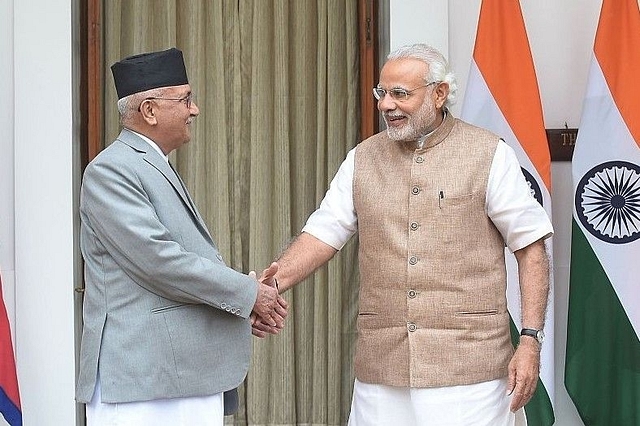
The Himalayan Chill In India-Nepal Ties Is Blowing Over With Both Sides Lining Up Series Of Meetings
A number of high-level exchanges between the two countries are being scheduled after Oli jettisoned the anti-India stance he had adopted to stave off a grave political crisis within his party.
India-Nepal ties, which had been damaged by Nepal Prime Minister Khadga Prasad Sharma Oli’s jingoism (read this), is finally set for a course correction with Kathmandu initiating conciliatory measures.
A number of high-level exchanges between the two countries are being scheduled after Oli jettisoned the anti-India stance he had adopted to stave off a grave political crisis within his Nepal Communist Party (NCP).
Oli broke the ice by placing a call to Prime Minister Narendra Modi on Independence Day (15 August). This call was preceded by a tweet by Oli greeting Modi and the people of India on the eve of Independence Day.
During the 15-minute call, the two premiers discussed ways to strengthen bilateral ties. Modi underlined the deep civilisational ties between the two countries and urged Oli to strengthen those ties.
Oli’s overtures were quickly followed two days later by talks between India’s Ambassador to Nepal Vinay Kwatra and Nepal’s Foreign Secretary Shankar Das Bairagi. The two discussed the status of the India-aided development projects in the Himalayan country and decided to fast-pace those projects.
Since then, at Oli’s insistence, officials in Nepal’s Foreign Ministry and others have established contact with India and have been urging New Delhi to sit for talks over various issues with Nepal.
New Delhi has, finally, agreed to Nepal’s request and told Kathmandu that only official-level talks would be held for now.
However, New Delhi has also firmly conveyed to Kathmandu that any more ‘adventurism’ by Nepal’s ruling politicians would set the clock back on ties between the two countries.
A senior official in India’s Ministry of External Affairs (MEA) told Swarajya that Kathmandu has also been gently ticked off for trying to play China against India and for placing India-Nepal ties at the altar of domestic political expediency.
Nepal’s Ambassador to India, Nilamber Acharya, who has been requesting a meeting with Foreign Secretary Harsh Vardhan Shringla for the last few months, got to meet National Security Adviser (NSA) Ajit Doval last week.
At that meeting, which has been deliberately downplayed by India, Acharya pleaded for restoration of bilateral ties. Doval reportedly told Acharya that irritants in India-Nepal ties caused by Nepal’s claims over Indian territories in Uttarakhand and its subsequent cartographic assertion have to be sorted out first.
At the 30-minute meeting, the Nepali envoy requested that a meeting of the India-Nepal Joint Commission co-chaired by the foreign ministers of the two countries, be scheduled within the next couple of months.
But Doval is learnt to have told Acharya that a foreign minister-level meeting between the two sides can take place only after a number of issues that have upset ties between the two countries, are sorted out through official-level talks first.
Apart from laying claim to Kalapani, Lipulekh and Limpiyadhura in Uttarakhand, Nepal also issued maps to show these areas within its territory. Oli then issued a number of anti-India statements and made fantastical claims of Bhagwan Ram having been born in Nepal.
Oli’s actions have, predictably, angered India, and New Delhi is in no mood to oblige Nepal’s wish for minister-level meetings between the two sides.
Kathmandu is also keen to host Foreign Secretary Shringla within the next few weeks, but MEA officials pointed out that Shringla’s counterpart in Nepal, Shankar Das Bairagi, is set to retire on 11 October. India would rather wait for a new foreign secretary to take over in Kathmandu before sending Shringla there.
Doval assured the Nepali envoy that India is keen on continuing with official-level talks with Nepal. But such talks have to be meaningful and should iron out differences between the two countries.
Only after such talks make tangible progress can minister-level talks take place. Nepal is ready to send its Foreign Minister, Pradeep Gyawali, to New Delhi as soon as India agrees to host him. But that, say MEA officials, may not happen very soon.
Oli has also initiated back-channel talks with India through former diplomats and some prominent civil society leaders, who have good relations with India.
Nepal’s former ambassador to India, Deep Kumar Upadhyay, who has many friends in India, is one person who has been fielded by Oli to win back New Delhi’s trust. Some prominent academics and scientists of Nepal are also involved in these efforts.
New Delhi has made it clear to all these interlocutors that India cannot be used as a card by Nepal’s political establishment. Nepal’s politicians should also stop furthering China's narrative.
Doval reportedly told Acharya that once Nepal’s political leadership agrees to these basic ground rules, official ties between the two countries can get back on an even keel.
India does not want Nepal’s politicians to adopt a jingoistic stance against India for the sake of domestic political compulsions and will not stomach any political adventurism like that employed by Oli.